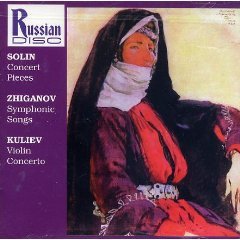| All Artists: USSR Radio and TV Large Symphony Orchestra Title: Lev Solin: Concert Pieces for Symphony Orchestra (1956) / Nazib Zhiganov: Symphonic Songs (1965) / Tofik Kuliev: Violin Concerto in A Minor Members Wishing: 0 Total Copies: 0 Label: Russian Disc Release Date: 10/25/1994 Genre: Classical Styles: Forms & Genres, Concertos, Instruments, Strings Number of Discs: 1 SwapaCD Credits: 1 UPC: 748871104624 |
Search - USSR Radio and TV Large Symphony Orchestra :: Lev Solin: Concert Pieces for Symphony Orchestra (1956) / Nazib Zhiganov: Symphonic Songs (1965) / Tofik Kuliev: Violin Concerto in A Minor
CD Details |
CD ReviewsAn intriguing glimpse of musical traditions virtually unknow G.D. | Norway | 09/05/2009 (4 out of 5 stars) "It becomes more and more apparent that - at least in the West - we are only beginning to scratch the surface of the wealth of music composed in Russia and the former Soviet states during the Soviet period. Some treasures have already been uncovered - Boris Tchaikovsky and the Ukrainian Dmitry Klebanov spring to mind - but there seems to be whole traditions of composition that are virtually unknown. I won't claim that any of the music on this disc rival the music of the two composers just mentioned, but it does give a glimpse of a pretty unknown quantity of music displaying a surprising range of styles.
Lev Solin (b. 1923) is apparently most famous for his works for the stage, radio and TV productions. His Concert Pieces for Symphony Orchestra are, however, the least interesting music on this disc, written in a style that comes across as a heavily diluted mix of Prokofiev and Khachaturian - brash and banal but tuneful and probably worth hearing once. Nazib Zhiganov (1911-1988) is one of those composers whose name appears in several spelling variants in the West (including Cihanov and Jihanov). He was a Tatar composer (also a statesman), and important enough that the Kazan music conservatory was named after him in 2000. His music - and there's a lot of it, including 8 operas and 17 symphonies - is heavily influenced by Tatarian folk music and folk lore. Perhaps since Tatarian folk music is an unknown quantity to me, his Symphonic Songs for orchestra (from 1965), where each movement is based on a genuine folk song, comes across as having a melodic profile not quite like anything else I've heard. This is a finely constructed, creative and atmospheric work, however, if not quite a masterpiece, and it surely makes me want to hear more of Zhiganov's output. The most immediately impressive work on the disc, however, is the violin concerto in a minor by the Azerbaijanian composer Tofik Kuliev (1917-2000, also spelled `Guliyev'). Kuliev is apparently most famous for his operettas, songs and music for films, but he was clearly able to write distinguished work in more serious genres, and the concerto at hand is notable for its inventive melodic content and vividly rhythmic, folk-song based structure. Mark Lubotsky is a fine soloist in the concerto, and the orchestral parts and the other orchestral music is performed with spirit and verve by the Moscow Philharmonic Orchestra (Solin) and the USSR Radio and TV Large Symphony Orchestra (the rest) under Yuri Temirkanov - more impressive for their spirit and color than their finesse, it must be admitted. Sound quality is pretty fine, in fact (Soviet recordings from 1965, 1967 and 1974 respectively). All in all, then, while there are no indisputable masterpieces here, I have still sort of come to treasure this disc for the view it offers of rich musical traditions more or less unrepresented elsewhere, and I am surely willing to recommend it to the adventurous." |


 Track Listings (14) - Disc #1
Track Listings (14) - Disc #1